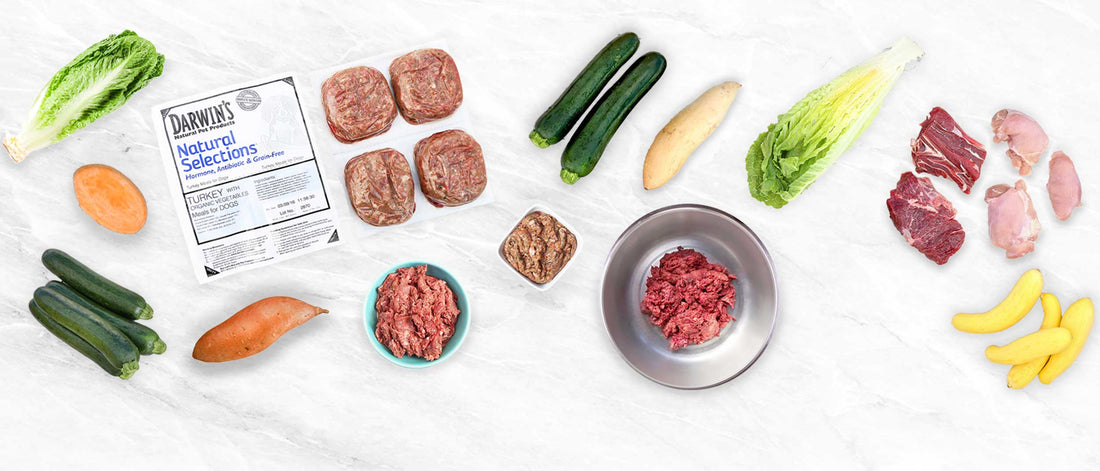
Best Protein for Dogs: Nutritional Insights & Sources
Written by Darwin's
A frequent question we get from new pet owners trying raw dog food for the first time is, “How do we decide what is the best protein for dogs?” For most, the answer is a simple one: Choose a meat that you know your dog already likes or has eaten before. Try out a few different varieties to find his favorite.
For some dogs, such as a senior dog or a sick dog that needs extra attention, pet owners may want to do a little more research into the specific meats they’re feeding their pups. For that, we’ve broken down each of our single-protein Natural Selections™ meals. So, what raw meat can dogs eat? Dogs can eat a variety of raw meats such as beef, chicken, turkey, and lamb. Each raw dog food variety is composed of a single meat protein and is frozen fresh.
Protein Sources for Dogs
Beef
Beef dog food, along with chicken dog food, are among the most commonly fed protein sources for dogs. For one, it’s palatable and most dogs enjoy the taste of beef.
In addition, beef is an excellent source of protein, containing all the essential amino acids required by dogs. It contains many essential nutrients including high levels of Zinc and Iron which help maintain stamina and heart health. Beef is rich in the minerals Manganese, Selenium, and Potassium, and in B vitamins that improve the absorption of protein, fat, and carbohydrates.
Protein-packed beef is also a great base for a ketogenic diet, which may be prescribed by a vet for dogs with epilepsy or diabetes. The benefits of beef don’t have to stop at mealtime, extras like our freeze-dried liver treats or our beef femur bones for dogs can be the cherry on top of a beef-based diet.
To complement your dog's beef-based meals and support dental health, consider offering beef femur bones for dogs as a natural, nutrient-rich chew option.

Chicken
Chicken is another commonly fed protein for dogs. It’s typically leaner than beef and easy to digest. Is wet food better for dogs? When it comes to chicken, wet food can be an excellent way to provide hydration and is often more appealing to picky eaters. Your dog can also get their chicken fix with dog treats like our freeze-dried chicken hearts.
Additionally, chicken is rich in the trace mineral Selenium, which supports thyroid health and enhances your dog’s immune system. Chicken is high in Vitamin B which aids in controlling glucose levels as well as converting protein and fat into usable energy. Vitamin B6 supports energy metabolism and cardiovascular health. You might also consider treats like freeze-dried chicken hearts, which are packed with protein and can be a tasty and nutritious addition to your dog's diet.
Poultry, such as chicken and turkey, are also great bases for a bland diet, most often prescribed for pups with sensitive stomachs.

Turkey
Turkey is a lean meat that is a rich source of vitamins and minerals which help to regulate blood pressure, boost the immune system and facilitate the processes of healing. Turkey meat is an excellent source of essential amino acids in protein. It is lower in saturated fat and cholesterol than chicken or beef. It also contains the essential Amino Acid Tryptophan, which plays an important role in strengthening the immune system.
As more dogs are developing allergies to beef or chicken, turkey serves as a great alternative for dogs with tummy troubles or allergies.

Duck
Duck is an excellent source of protein that is low in saturated fat. A rich source of most B vitamins and contains useful amounts of Phosphorous and Potassium. It’s an excellent source for the cancer-protective B Vitamin Niacin that aids in controlling glucose levels in the body as well as converting protein, fat, and carbohydrates into usable energy; Pyridoxine (Vitamin B6) that supports energy metabolism and Cardiovascular health.
Duck is also often used as a “novel” protein, meaning it’s less common in the market than chicken, beef, turkey, or pork. For this reason, it’s great to use in an elimination diet. At Darwin’s, this protein is easy to shop for, with popular duck choices like our duck neck dog treats and duck dog food.

Lamb
Lamb is a good source of protein and a healthy, novel red meat alternative for cats and dogs that may have allergies or intolerances to other traditional red meats. Lamb is rich in Zinc and provides essential minerals such as Potassium, Iron, Manganese, Thiamine, Vitamins E, B12, D3.
Similar to duck, lamb’s novelty makes it ideal for elimination diets. Lamb bones are also a really great addition to a healthy diet, cleaning teeth and diversifying your dog’s diet.
Blended Protein: The Power of Variety
While individual protein sources like beef, chicken, turkey, duck, and lamb each offer unique benefits for our furry friends, there's something truly magical about combining them. Blended protein is like a symphony of flavors and nutrients that can take your dog's dining experience to a whole new level.
One of the key advantages of blended protein is the balance it brings to your dog's diet. Each protein source offers its own set of vitamins, minerals, and amino acids. If your dog has specific food sensitivities or a food allergy, blended protein can be a game-changer. Since allergies often develop towards one particular protein source, offering a blend can minimize the risk.
Factors to Consider When Choosing Dog Protein
It's not one size fits all, my friends. When choosing the best protein and best dog food for your pup, you need to consider various factors like their breed, age, and specific dietary needs. It's like tailoring a suit – it has to fit just right.
For Active Dogs
If you have an active dog, they might need a high-protein diet to fuel their adventures. Beef or chicken is an excellent choice for our active buddies.
For Senior Dogs
As our loyal companions age, their nutritional needs change. For older dogs, consider high-protein food options like lamb or turkey for a more gentle approach.
For Puppies
Chicken is a fantastic option for puppies. It's easy to digest and is a high-protein dog food that helps them grow into healthy, happy adults. Also, fish is rich in omega-3 fatty acids, making it a great option.
For Picky Eaters
Some dogs are finicky when it comes to food. If you have a picky eater, consider novel proteins like duck to keep things exciting.
For Dogs with Allergies
If your dog has food allergies or a sensitive stomach, you understand the importance of finding the right protein source. Novel proteins like duck or fish are heroes for those with sensitive tummies.
Protein Percentage
The protein content in your dog's food plays a crucial role in their well-being. It's a good idea to ask your vet about the ideal amount of animal protein for your dog. For highly active dogs, a higher protein content fuels their adventures. However, if your pet has specific dietary requirements, opting for low-protein options can ensure a balanced diet that suits their needs perfectly.
Picking a Protein with Darwin's Pet
Choosing the best protein for your dog isn't just about what's delicious; it's about providing them with the nutrition they need to thrive. When it comes to truly elevating your dog's diet, consider Darwin's natural pet food. These carefully crafted options offer the purity of single-meat protein sources, frozen fresh and fully raw - and our options don’t stop with the proteins on this list. Find unique protein sources with options like our freeze-dried salmon dog treats. The options are endless! With Darwin's Pet, you're not just feeding your dog; you're nurturing their well-being and ensuring they live their best, tail-wagging life.



